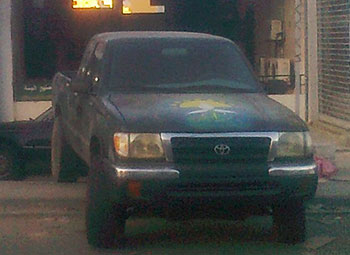|
||
Just don't say it is trash
'The center' truck serves many purposes: it carries old tires thrown by people on the sides of the streets and take them to a new factory in the city that turns old tires into carpets , tiles, playground covers, and so many other things. It, also, collects plastics, wood, and other inorganic materials and take them to collection places. All these things the truck does for free; just to help clean the community and help environmentally-friendly businesses. And, to prove the center's point that trash is a man-made concept, an experiment was done on the trash of one business in the neighborhood that produced a lot of pieces of leather; natural and artificial. Trying for years to think of an idea that would make it feasible to recycle the cuts and pieces of leather in a meaningful way, nothing was working until I decided out of frustration with this situation to collect those pieces and just keep them in the back of the Center's truck. And, I did just that. However, and to my surprise, the second day, another business owner in the same neighborhood who does textile repairs approached me and said: I am sorry, while you were away I borrowed some of your small leather pieces to use in my textile repairs. I smiled at him and he could not guess why, answering with a big smile: of course, no problem. 'Of course' I was just the means god used to make his will "everything we created for a purpose" Yes, nothing god created without a purpose. And if we don't know the purpose it is because we did not try hard enough to figure it out. Exactly, it is like energy: neither created nor destroyed, it is always transformed (recycled) This experiment made me think about going further with the idea. What if municipalities or the government used public properties just to do that i.e collect left over from businesses and search for other places where these residuals are needed. Of course, separating theses items is the basis for any such operation. Then, recycling when available. And, above all, fighting the stigma of trash because nothing is more damaging to the environment than the stigma of trash; one time I was invited by a dear friend to a dinner of fish. And, I like fish. Maybe that is why my dear friend decided to throw a lot of fish on the table. And, as you might know, our capacity to take fish in is very limited sizewise. So, a lot of the fish was left on the table. And, nothing could convince my dear friend that what was left on the table does not belong to the trash. He yelled: don't do it, it is socially unacceptable. So I had to leave the place: one eye looking for the way out, the other eye sneaking a final peek into the stigmatized fish that were about to be trashed away because of an unfair social stigma. And, all of the sudden I thought of the word 'prejudice'. Of course it is prejudice. What else could it be? Who decided the difference between the fish we ate and those somebody decided that they belong to trash? It is definitely prejudice, Otherwise, can somebody explain the difference to me?
Majed Harb, Chairman of the Board Maher Harb Center for Environmental Research
|

